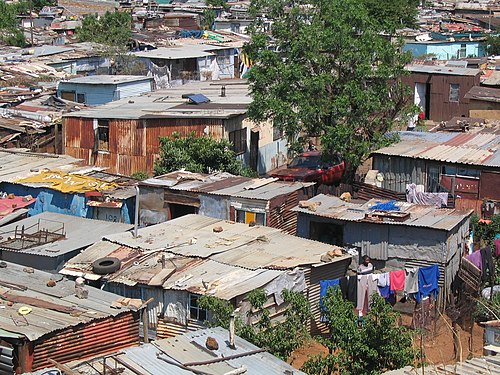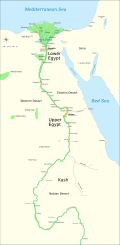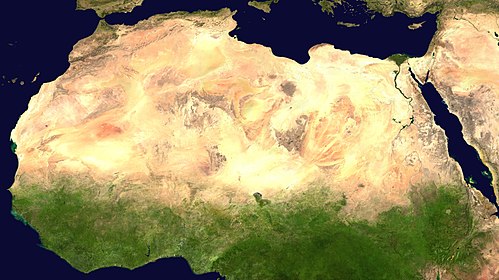Portal:Africa



Africa is the world's second-largest and second-most populous continent after Asia. At about 30.3 million km2 (11.7 million square miles) including adjacent islands, it covers 20% of Earth's land area and 6% of its total surface area. With nearly 1.4 billion people as of 2021, it accounts for about 18% of the world's human population. Africa's population is the youngest among all the continents; the median age in 2012 was 19.7, when the worldwide median age was 30.4. Based on 2024 projections, Africa's population will exceed 3.8 billion people by 2100. Africa is the least wealthy inhabited continent per capita and second-least wealthy by total wealth, ahead of Oceania. Scholars have attributed this to different factors including geography, climate, corruption, colonialism, the Cold War, and neocolonialism. Despite this low concentration of wealth, recent economic expansion and a large and young population make Africa an important economic market in the broader global context, and Africa has a large quantity of natural resources.
Africa is highly biodiverse; it is the continent with the largest number of megafauna species, as it was least affected by the extinction of the Pleistocene megafauna. However, Africa is also heavily affected by a wide range of environmental issues, including desertification, deforestation, water scarcity, and pollution. These entrenched environmental concerns are expected to worsen as climate change impacts Africa. The UN Intergovernmental Panel on Climate Change has identified Africa as the continent most vulnerable to climate change.
The history of Africa is long, complex, and varied, and has often been under-appreciated by the global historical community. In African societies the oral word is revered, and they have generally recorded their history via oral tradition, which has led anthropologists to term them "oral civilisations", contrasted with "literate civilisations" which pride the written word. African culture is rich and diverse both within and between the continent's regions, encompassing art, cuisine, music and dance, religion, and dress.
Africa, particularly Eastern Africa, is widely accepted to be the place of origin of humans and the Hominidae clade, also known as the great apes. The earliest hominids and their ancestors have been dated to around 7 million years ago, and Homo sapiens (modern human) are believed to have originated in Africa 350,000 to 260,000 years ago. In the 4th and 3rd millennia BCE Ancient Egypt, Kerma, Punt, and the Tichitt Tradition emerged in North, East and West Africa, while from 3000 BCE to 500 CE the Bantu expansion swept from modern-day Cameroon through Central, East, and Southern Africa, displacing or absorbing groups such as the Khoisan and Pygmies. Some African empires include Wagadu, Mali, Songhai, Sokoto, Ife, Benin, Asante, the Fatimids, Almoravids, Almohads, Ayyubids, Mamluks, Kongo, Mwene Muji, Luba, Lunda, Kitara, Aksum, Ethiopia, Adal, Ajuran, Kilwa, Sakalava, Imerina, Maravi, Mutapa, Rozvi, Mthwakazi, and Zulu. Despite the predominance of states, many societies were heterarchical and stateless. Slave trades created various diasporas, especially in the Americas. From the late 19th century to early 20th century, driven by the Second Industrial Revolution, most of Africa was rapidly conquered and colonised by European nations, save for Ethiopia and Liberia. European rule had significant impacts on Africa's societies, and colonies were maintained for the purpose of economic exploitation and extraction of natural resources. Most present states emerged from a process of decolonisation following World War II, and established the Organisation of African Unity in 1963, the predecessor to the African Union. The nascent countries decided to keep their colonial borders, with traditional power structures used in governance to varying degrees. (Full article...)
Selected article –

South Kasai (French: Sud-Kasaï) was an unrecognised secessionist state within the Republic of the Congo (the modern-day Democratic Republic of the Congo) which was semi-independent between 1960 and 1962. Initially proposed as only a province, South Kasai sought full autonomy in similar circumstances to the much larger neighbouring state of Katanga, to its south, during the political turmoil arising from the independence of the Belgian Congo known as the Congo Crisis. Unlike Katanga, however, South Kasai did not explicitly declare full independence from the Republic of the Congo or reject Congolese sovereignty.
The South Kasaian leader and main advocate, Albert Kalonji, who had represented a faction of the nationalist movement (the Mouvement National Congolais-Kalonji or MNC-K) before decolonisation, exploited ethnic tensions between his own ethnic group, the Baluba, and the Bena Lulua to create a Luba-focused state in the group's traditional heartland in the south-eastern parts of the Kasai region. As sectarian violence broke out across the country, the state declared its secession from the Congo on 9 August 1960 and its government and called for the Baluba living in the rest of the Congo to return to their "homeland". Kalonji was appointed president. Although the South Kasaian government claimed to form an autonomous part of a federal Congo-wide state, it exercised a degree of regional autonomy and even produced its own constitution and postage stamps. The state, supported by foreign powers, particularly Belgium, and funded by diamond exports, managed numerous crises, including those caused by the large emigration of Luba refugees, but became increasingly militarist and repressive. (Full article...)
Featured pictures –
Did you know (auto-generated) -

- ... that Kenyan coffee farmer "Pinkie" Jackson amassed Africa's largest collection of native butterflies?
- ... that Jane C. Beck traveled to Virginia, West Africa, and England to research the family history of Daisy Turner for her 2015 book Daisy Turner's Kin: An African American Family Saga?
- ... that African-American journalist Erna P. Harris was called a "fearless critic" of the internment of Japanese Americans by the US government during World War II?
- ... that Gil Scott-Heron's 1975 song "Johannesburg" was banned in South Africa during apartheid?
- ... that Richard Stratton's diplomatic career took him "from South America to Japan, and from Southern Africa to the foothills of the Himalayas"?
- ... that the communist-era science-fiction novel Małe zielone ludziki presents a futuristic depiction of Africa that reflects Polish perceptions of the continent during the Cold War?
Categories
Selected biography –
Wole Soyinka (13 July 1934) is a Nigerian author, best known as a playwright and poet. He has written three novels, ten collections of short stories, seven poetry collections, twenty five plays and five memoirs. He also wrote two translated works and many articles and short stories for many newspapers and periodicals. He is widely regarded as one of Africa's greatest writers and one of the world's most important dramatists. He was awarded the 1986 Nobel Prize in Literature for his "wide cultural perspective and poetic overtones fashioning the drama of existence".
Born into an Anglican Yoruba family in Aké, Abeokuta, Soyinka had a preparatory education at Government College, Ibadan and proceeded to the University College Ibadan. During his education, he co-founded the Pyrate Confraternity. Soyinka left Nigeria for England to study at the University of Leeds. During that period, he was the editor of the university's magazine, The Eagle, before becoming a full-time author in the 1950s. In the UK, he started writing short stories and making records for the BBC Lecture series. He wrote many plays which were performed on radios and in theatres in Nigeria and the UK, especially the Royal Court Theatre. In 1958, he married a British woman whom he had met in Leeds. In 1963, after the divorce of his first wife, he married a Nigerian librarian and, subsequently, Folake Doherty in 1989. (Full article...)
Selected country –
 |
 |
|

| ||
Angola, formally the Republic of Angola (Portuguese: República de Angola, pronounced [ʁɛˈpublikɐ dɨ ɐ̃ˈɡɔlɐ], Kongo: Repubilika ya Ngola), is a country in south-central Africa bordering Namibia to the south, the Democratic Republic of the Congo to the north, Zambia to the east, and the Atlantic Ocean to the west. The exclave province Cabinda also borders the Republic of the Congo to the north. At 481,321 mi² (1,246,700 km²), it is the world's twenty-third largest country.
A former Portuguese colony, it has considerable natural resources, among which oil and diamonds are the most significant. Angola's economy has undergone a period of transformation in recent years, moving from the disarray caused by the Angolan Civil War to being the fastest growing economy in Africa and one of the fastest in the world. Growth is almost entirely driven by rising oil production which surpassed 1.4 million barrels per day in late-2005 and which is expected to grow to 2 million barrels per day by 2007. (Read more...)
Selected city –

Gaborone (UK: /ˌɡæbəˈroʊni, ˌhæb-/ GAB-ə-ROH-nee, HAB-, US: /ˌɡɑːbəˈroʊni, -neɪ/ GAH-bə-ROH-nee, -nay, Tswana: [χabʊˈrʊnɛ]) is the capital and largest city of Botswana, with a population of 246,325 based on the 2022 census, about 10% of the total population of Botswana. Its metropolitan area is home to 534,842 inhabitants at the 2022 census.
Gaborone is situated between Kgale Hill and Oodi Hill, near the confluence of the Notwane River and Segoditshane River in the southeastern corner of Botswana, within 15 kilometres (9.3 mi) from the South African border. The city is served by the Sir Seretse Khama International Airport. It is an administrative district in its own right, but is the capital of the surrounding South-East District. Locals often refer to the city as GC or Motse-Mshate. (Full article...)
In the news
- 22 April 2025 –
- Interpol rescues 33 West Africans, including people from Benin, Togo, Burkina Faso, and Ghana, from human trafficking rings in the Ivory Coast. (AP)
- 21 April 2025 – Spillover of the Sudanese civil war
- 2025 Nasir clashes
- The South Sudan People's Defence Forces capture the town of Nasir in Upper Nile State from the Nuer White Army. (Reuters)
- 21 April 2025 – Boko Haram insurgency
- The Islamic State claims responsibility for a series of deadly attacks targeting Christians and security forces in Borno and Adamawa, Nigeria earlier this month that killed at least nine people and injured several others. (Reuters)
- 21 April 2025 – 2025 Boston Marathon
- In long-distance running, Kenyan road runner John Korir wins the men's competition at the Boston Marathon with a time of 2:04:45 which, along with his brother Wesley Korir's win in 2012, makes them the first and only set of brothers to win the event. (The New York Times)
- Kenyan athlete Sharon Lokedi wins the women's competition with a time of 2:17:22 and sets the new course record, surpassing Buzunesh Deba's record in 2014. (WBZ-TV)
Updated: 23:05, 23 April 2025
General images -
Africa topics
More did you know –

- ... that the British Museum's oldest African-American object is the Akan Drum (pictured) that was used to "dance the slaves"?
- ... that L.C. Lecesne rose to prominence as an activist against slavery after the British Government compensated him for his illegal exile from Jamaica?
- ... that despite receiving a budget allocation in 2003, the public sports stadium in Gibeon, Namibia, hadn't been repaired as of December 2007?
- ... that Thomas Edward Wilkinson was made Bishop of Zululand after his predecessor in South Africa, John Colenso, was excommunicated?
Related portals
Major Religions in Africa
North Africa
West Africa
Central Africa
East Africa
Southern Africa
Associated Wikimedia
The following Wikimedia Foundation sister projects provide more on this subject:
-
Commons
Free media repository -
Wikibooks
Free textbooks and manuals -
Wikidata
Free knowledge base -
Wikinews
Free-content news -
Wikiquote
Collection of quotations -
Wikisource
Free-content library -
Wikispecies
Directory of species -
Wikiversity
Free learning tools -
Wikivoyage
Free travel guide -
Wiktionary
Dictionary and thesaurus


























































































